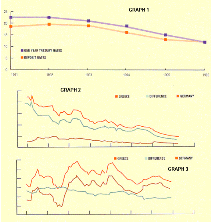
A Journal of Foreign Policy Issues

By Nicos M. Christodoulakis, Deputy Minister of Finance of the
Hellenic Republic
The article describes some of the structural aspects of the economic
and fiscal policies of Greece that aim at making the country eligible
to join the EMU. Such policies are being successfully implemented
and have proved beneficial to the economic activity of the country.
Institutional, nominal, and real convergence with other EU countries
is on course under the best possible conditions.
 I wish to establish: First, that the nature of fiscal adaptation
is such that it benefits the economy as a whole, and it is not
simply another tax raising exercise that might lead to a severe
depression.
I wish to establish: First, that the nature of fiscal adaptation
is such that it benefits the economy as a whole, and it is not
simply another tax raising exercise that might lead to a severe
depression.
Secondly, that Greece's economy has by now entered a phase of
sustainable development, while the role of firms and working people
has strikingly changed from the past.
The nature of fiscal adaptation
The 1997 budget is more balanced than its predecessors in relation to which sector will bear the burden of fiscal consolidation. In previous years, this burden fell mainly on taxes and, more specifically, on indirect taxes, the distorting effects of which are wellknown. Starting with the 1997 budget, however, the burden of adaptation to the convergence criteria will henceforth be increasingly borne by the curtailment of the primary expenditures and the reduction in interest payments. This is no accident, but a policy designed to meet the challenges facing the Greek economy; it is also the only way to ensure a viable and stable future for Greece as a member of the EMU. Eligibility for EMU is only an initial step. EMU membership does not mean that economic efforts should be relaxed after getting the entry ticket. Within the EMU, every national economy will have an important role to play, albeit in an environment radically different from the one prevailing before.
 Fiscal competition among member countries will be a dominant feature
in an EU where economic and monetary union is implemented. It
is precisely because EMU will have finally and irreversibly abolished
any residual discretion, which member countries might still possess
in deciding monetary policy, that national governments will tend
to maximise the fiscal powers still in their hands. But since
they will be obliged to keep a low deficit under the provisions
of the Stability Pact, national governments will tend to maximise
tax revenue. The amount of tax collection will be the chief remaining
instrument for the implementation of the various fiscal policies
they wish to pursue.
Fiscal competition among member countries will be a dominant feature
in an EU where economic and monetary union is implemented. It
is precisely because EMU will have finally and irreversibly abolished
any residual discretion, which member countries might still possess
in deciding monetary policy, that national governments will tend
to maximise the fiscal powers still in their hands. But since
they will be obliged to keep a low deficit under the provisions
of the Stability Pact, national governments will tend to maximise
tax revenue. The amount of tax collection will be the chief remaining
instrument for the implementation of the various fiscal policies
they wish to pursue.
This brings up another issue: Within the confines of EMU, the fiscal future of countries participating in it will depend largely on the fiscal competition among them. This is because any measures increasing the tax burden rather than the tax base will render the country non-competitive, given that capital and labour will be increasingly free to move from country to country. It is therefore obvious that the countries striving to become members of the EMU must try to reduce the fiscal burdens on their tax payers well in time so as to attract local and foreign capital, enlarge their tax bases, and thus increase the state's revenues.
Taking this argument into account, our policy is to fight tax
evasion, to ensure fiscal justice, to increase efficiency, and
to reduce the number fiscal distortions and disincentives to enterprises
and employees.
Fiscal and institutional adjustment
The EU countries have started to evaluate more carefully the extent and effectiveness of their expenditures. This is now the main objective of fiscal policy in Greece implemented by the government's path-breaking 1997 Budget. This policy is focused on reducing the expenditures that cause distortions to economic activity, such as the interest rate payments of public debt. These expenditures absorb funds potentially available for productive and job-creating investment, and channel them to the state's coffers.
One indicator of the public's confidence in the government is the difference between the level of interest rates offered by the government and those who lend money to it, and between the interest rates offered by private banks and those who deposit money in them. Savers and investors are supposed to trust private banks more than the State, and thus require higher rates to invest in government securities. In December 1991, this difference was 4.5 percentage points higher than what the private banks were offering their depositors. Today the difference is 0.4%. Graph 1 clearly shows that the spread between the deposit rates of private banks and the Treasury bill rate has recently been drastically narrowed. This indicates not only the dramatic reduction in the cost of borrowing-with all the ensuing benefits of funds being made available for investment-but also a spectacular improvement shown in the degree of trust savers have in the government and in the credibility of its economic policies.
I will now explain more specifically how we allocate primary expenditures.
Here again, our innovations have a twofold aim. On the one hand,
we naturally want to increase our credibility in pursuing our
fiscal objectives; on the other hand, we aim to maximise the social
benefit deriving from public expenditures.
Better governance at a lower cost
Over the last years, the expenditures of the State budget were considered only in terms of their level. Public debate on the budget was largely dominated by a clash in percentage points. Discussion on the budget's results, based on evidence of social benefits achieved, was negligible. This government has embarked on a strenuous effort to monitor expenditure carefully and to set up a procedure for evaluating public expenditures and maximising their effectiveness. We have already started closely examining the operational costs of the various ministries and the way subsidies to outside bodies are being used. In the 1998 budget, we will report on and evaluate the results of the new policy.
We must abandon the habit of exclusively considering the level of state expenditures, and instead adopt as our main concern how this money is spent and what social benefits the government's expenditures provide. An example of the change in budget policy is that the present social policy is targeted to those with maximum need, i.e., low income pensioners. The introduction of income criteria in social policy does not aim at lowering the overall social expenditures as some allege, but at focusing these expenditures on areas of maximum need. This is the only way to target social assistance to recipients who need it most, and to stop financing an army of go-betweens. Many of our EU partners have by now adopted this criterion in implementing their social policies.
Other institutional changes made along the same lines are the introduction of new salary scales and the new pension laws designed to simplify the existing labyrinthine and ineffective system by reinstating sound principles and proper criteria of eligibility and remuneration, to the extent that it is fiscally feasible. Such measures include the efficiency of the civil service in a climate of co-operation, avoiding surprises and pointless shadow boxing between those involved.
With the new law on the Reduction and Optimisation of Public Expenditures
already being enforced, great strides have been made in the levels
and methods of hiring civil servants, in the evaluation of subsidies
to various bodies, as well as in the transparency and control
over the guarantees extended to public corporations.
The process of convergence
What all this means is that Greece's course towards membership in the EMU is much more than a mere convergence of numbers. We all know that the quantitative criteria, such as 3% for the deficit and 60% for the public debt, are not set in concrete. They represent an agreement that all states wishing to participate in EMU will sort out their fiscal problems well before EMU starts functioning so as to avoid any serious divergencies from the other EMU economies. Our country has and will continue to carry out a serious
programme which follows the requirements for joining the Economic and Monetary Union. We have, however, gone considerably beyond that. Conscious of the fact that fiscal adaptation needs the introduction of serious structural changes and institutional modernisation, we are simultaneously preparing the Greek economy for optimum performance once Greece becomes a full member of the EMU.
Precisely because these changes have cut across ineffectual institutional practices and entrenched habits, they have borne fruit: in spite of the impressive fiscal progress reported so far, the Greek economy has not suffered any serious slumps like the ones that have hit other European economies. Quite the contrary, in fact. After many years of lagging behind its partners, Greece is no longer diverging from the EU. During the last two years, its rate of economic growth has exceeded the European average. Greece has thus achieved something that is rather unusual, namely, not just nominal convergence but a real convergence with the economies of its partners (see Graphs 2 and 3). The graphs present the nominal and real interest rate differentials between Greece and Germany, the anchor country of the EU.
Our goal of "convergence without recession" is being
achieved. We feel vindicated in our policies that are presently
being adopted by other European countries.
The new economic environment
When the economy was in dire fiscal straits, the damage done was not confined to a sense of gloom pervading the economically active population.
The depressing climate had fostered the growth of various lobbies pushing for preferential treatment as a means for a category of wage earners or a firm to increase its remuneration. Entrepreneurship in Greece at times came to mean increasing access to and pressure on the authorities to legalise all sorts of privileges through the State budget. This created great distortions in competition and in the chances for prosperity for firms and working people alike. Loans and subsidies to firms, housing loans, and benefits to employees were often granted not because they made any economic sense, but because of the pressures exerted by various groups.
All this has now been radically altered. The reduction in the social cost of money, the improvement in infrastructure, the modernisation of the banking system, and the new methods of financing businesses have created a new environment, allowing entrepreneurs to plan ahead and work free of the distortions of the past.
The most important change introduced by the new government is
that equal opportunities are now being afforded to all who strive
for a better life. These people can now expect to be rewarded
according to their efficiency and achievements. The country now
offers equal opportunities to entrepreneurs and citizens alike.